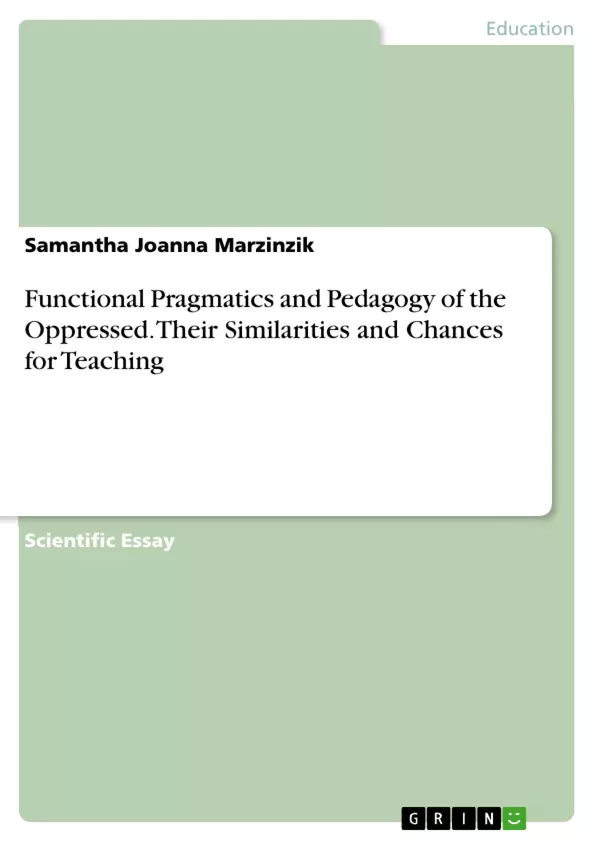This paper outlines the similarities between Paulo Freire’s ideas on the Pedagogy of the Oppressed and the research results on the Functional Pragmatics by Konrad Ehlich and Jochen Rehbein. It will also examine how both theories are related, connected with each other, what meaning they have for and on teaching, and how its results can be therefore positively used together to get the maximum chances for improving and transforming our teaching. This paper proposes one particular way to do so and gives insights into another perspective on teaching.
Inhaltsverzeichnis (Table of Contents)
- 1. Introduction - The Contradiction..
- 2. Functional Pragmatics - The Similarities to Freire's Theory
- 3. The Contradiction's Solution
- 4. The Chances for our Teaching..
- 4.1. One Chance - Using Functional Pragmatics in Teaching
- 4.2. One Example - Functional Pragmatics and Literary Texts..
- 4.3. Conclusion.......
Zielsetzung und Themenschwerpunkte (Objectives and Key Themes)
This paper aims to explore the parallels between Paulo Freire's ideas on the Pedagogy of the Oppressed and the research findings on Functional Pragmatics by Konrad Ehlich and Jochen Rehbein. The paper will also investigate the connection between these theories and their implications for teaching. It will analyze how the results of both approaches can be combined to enhance and transform teaching practices.
- The similarities between Freire's Pedagogy of the Oppressed and Functional Pragmatics.
- The "teacher-students contradiction" in traditional teaching.
- The limitations of traditional teaching methods.
- The potential of Functional Pragmatics to improve teaching practices.
- The role of classroom communication in fostering student learning and empowerment.
Zusammenfassung der Kapitel (Chapter Summaries)
- Chapter 1: Introduction - The Contradiction. This chapter introduces Paulo Freire's critique of traditional teaching methods and his concept of the "teacher-students contradiction." It argues that traditional teaching methods, where the teacher holds all the knowledge and authority, perpetuate oppression.
- Chapter 2: Functional Pragmatics - The Similarities to Freire's Theory. This chapter discusses the work of Konrad Ehlich and Jochen Rehbein on Functional Pragmatics, a method for analyzing linguistic activities in various contexts. It highlights the similarities between their findings and Freire's theories, particularly regarding the power dynamics in traditional classrooms.
- Chapter 3: The Contradiction's Solution. This chapter explores Freire's concept of "authentic education," which emphasizes student empowerment, critical thinking, and the ability to act upon the world. It argues that traditional teaching methods are not conducive to authentic education and proposes a more dialogical approach to teaching.
- Chapter 4.1: One Chance - Using Functional Pragmatics in Teaching. This chapter examines the potential of Functional Pragmatics to improve teaching practices by fostering student engagement and critical thinking. It explores how Functional Pragmatics can help teachers create more inclusive and dialogical learning environments.
- Chapter 4.2: One Example - Functional Pragmatics and Literary Texts.. This chapter provides a practical example of how Functional Pragmatics can be used in teaching by analyzing the use of language in literary texts. It demonstrates how Functional Pragmatics can enhance students' understanding of the complexities of language and its role in shaping meaning.
Schlüsselwörter (Keywords)
This paper focuses on the intersection of education, functional pragmatics, pedagogy, and oppression. It examines the linguistic structures in traditional classroom communication and explores alternative approaches to teaching that emphasize student participation, critical thinking, and empowerment. Key terms include: education, Functional Pragmatics, oppressed, teaching, language, literary texts, pedagogy, learning, and approach.
Frequently Asked Questions
What is Functional Pragmatics?
Functional Pragmatics is a linguistic method developed by Ehlich and Rehbein to analyze linguistic activities and communication structures in social contexts like classrooms.
How does Paulo Freire define the 'Pedagogy of the Oppressed'?
Freire's theory critiques traditional 'banking' education and advocates for a dialogical approach that empowers students to think critically and act upon their world.
What is the 'teacher-student contradiction'?
It refers to the traditional power imbalance where the teacher is the sole possessor of knowledge and the students are passive recipients, which Freire sees as oppressive.
How can Functional Pragmatics improve teaching?
By analyzing classroom communication, it helps identify patterns that hinder student participation and offers ways to create more inclusive, dialogical learning environments.
What is 'authentic education' according to Freire?
Authentic education is a process of liberation where students and teachers learn together through dialogue, critical reflection, and mutual respect.
- Quote paper
- Samantha Joanna Marzinzik (Author), 2022, Functional Pragmatics and Pedagogy of the Oppressed. Their Similarities and Chances for Teaching, Munich, GRIN Verlag, https://www.grin.com/document/1253102



